
- Home
- About Us
- Sustainability
- Investors
- News
- People & Culture
-
Regions

MTN Group has embarked on an exciting journey to leverage responsible Artificial Intelligence (AI) to reshape Africa at the leading edge of technology, igniting change, inspiring progress and creating a brighter future for generations to come.
“AI is no longer an enabler — it’s the engine reshaping businesses, redefining value creation and rewriting the rules of global innovation and competitiveness,” says MTN Group Digital Infrastructure CEO and GCTIO Mazen Mroué. “AI is not just about automation — it’s about boosting human potential, increasingly becoming seamlessly embedded into our daily activities, decisions and experiences, transforming how we live and work.”
He says AI is augmenting human intelligence like never before and “we at MTN are developing AI for Africa by Africans, unlocking sustainable value for all”.
According to PwC’s Global Artificial Intelligence Study, AI can transform global productivity and economic activity and is predicted to add US$15.7 trillion to the global economy by 2030.
Assuming Africa captures 10% of the global AI market, a recent SAP report projects that AI could add US$1.5 trillion to the continent’s economy by 2030. The SAP report also predicts that 230 million new digital jobs will be created in Africa by 2030. Statista projects that the AI market in Africa could reach US$4.51 billion in 2025 and grow to US$18.7 billion by 2030.
As AI adoption accelerates, the GSMA says it is crucial that it is designed, developed and deployed with ethical considerations in mind. As a result, the industry association collaborated with a group of operators and others to co-create a Responsible AI Maturity Roadmap, supporting the advancement of innovative and trustworthy AI applications.
MTN’s AI journey is designed around three key principles, in line with global best practice. These encompass a comprehensive governance structure aspiring to achieve ethical, effective and safe AI adoption; an agile and scalable operating model for measured AI implementation; and targeted use cases that deliver tangible value.
MTN has developed a world-class Responsible AI Policy to guide AI deployment and usage. It has also set up a special sub-committee of the Executive Committee to provide oversight, execution governance and impact management of the Group’s IT governance, with a special focus on AI.
As data quality, talent excellence, strategic partnerships and robust infrastructure are all essential to a successful AI implementation journey, MTN has designed an appropriate operating model and established an in-house AI Centre of Excellence (CoE) alongside a Cloud CoE to co-ordinate AI activities across the Group, supported by an internal Software Solutions team equipped with more than 300 engineers.
Driven to deliver tangible value for customers, communities and the business, MTN has identified numerous AI use cases across key business domains including Network, Finance, HR and Commercial functions.
“At MTN Group, under the group-wide transformation programme branded as ‘MTN Genova’, we are operationalising AI at scale to boost productivity, elevate customer experience, reduce costs and accelerate revenue generation,” says Mroué.
Through our strategic partnerships, we have adopted enterprise-grade Open AI and cloud-native services to implement AI and generative AI solutions powered by large and small language models (LLMs and SLMs). In parallel, we are promoting innovative collaborations with start-ups focused on local language LLMs to elevate customer experience solutions.
In the network domain, MTN is promoting interesting use cases like intelligent AI-enabled fuel consumption savings for data centres in South Africa; AI-driven cell site dynamic energy management in Benin; AI-driven fibre cut sensing in Côte d’Ivoire; and network traffic balancing and optimisation in Nigeria.
Accra, Ghana, June 22, 2025 – Demonstrating its commitment to advancing Africa’s development, MTN Group supported the 2025 Economic Governance School training for public officials from Ghana, South Africa and Kenya held in Accra last week.
The initiative, the result of collaboration between South Africa’s National School of Government (NSG), the Kenya School of Government (KSG) and the Ghana Institute of Management and Public Administration (GIMPA), is designed to strengthen senior leadership in the public sector and promote inclusive economic governance across the continent. It brings together legislatures, politicians and senior officials from all levels of the public service for a week of peer learning, policy dialogue and institutional exchange. Consequently, the delegation took time to visit the African Continental Free Trade Area (AfCFTA) Secretariat, which is charged with coordinating the creation of a single continental market for goods and services across Africa.
“As a pan-African business, we understand that Africa’s growth depends not only on investment in infrastructure, but also in people and institutions,” said Nompilo Morafo, MTN Group Chief Sustainability and Corporate Affairs Officer.
Since the training took place during MTN Group’s flagship 21 Days of Y’ello Care, the delegation also visited the MTN Ghana supported Opportunities Industrialisation Centre (OICG), which provides vocational, digital and entrepreneurial skills training for young people to enable them to earn a decent and dignified living.
“At MTN, we believe that everyone deserves the benefits of a modern connected life; therefore, in our view, education, training and strong institutions form the foundation for sustained progress. Also, when civil servants, policymakers and administrators are equipped with high-quality training, their collective decisions shape a more equitable, innovative and resilient future for their nations.”
MTN’s involvement reflects its broader approach to driving Africa’s progress through investment in leadership and institutional capacity. In addition to sponsoring the NSG, KSG and GIMPA programme, the Group contributed to the discourse, with senior executives participating in sessions focused on telecommunications, digital transformation, artificial intelligence and infrastructure financing.
MTN Ghana CEO Stephen Blewett and CIO Bernard Acquah joined Morafo in engaging on panels that explored the intersection of technology and governance. Discussions focused on the digital transformation of public services and the role of AI and infrastructure investment in supporting state capacity and economic inclusion.
South Africa’s Deputy Minister of Public Service and Administration Ms. Pinky Kekana, described the initiative as a valuable platform for engagement on governance challenges, saying: “The Economic Governance School offers a unique platform for elected and appointed public leaders to engage in critical analysis and reflective dialogue on the complex challenges confronting governance.”
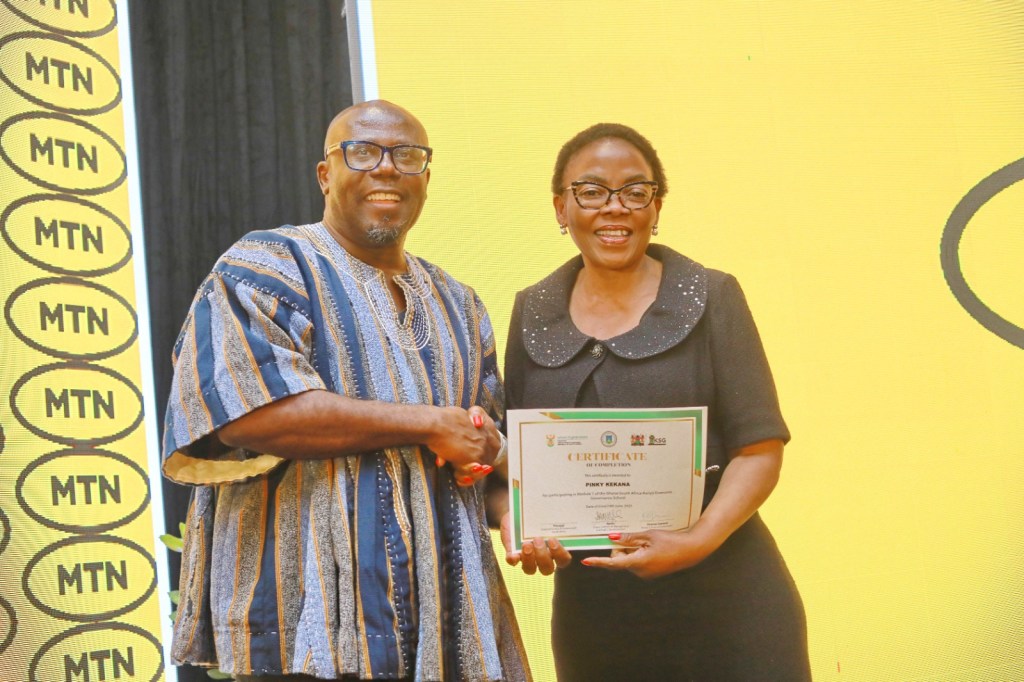
Director of GIMPA, Prof. Samuel Kwadwo Bonsu, welcomed MTN’s contribution and the cross-sector collaboration underpinning the programme: “We are proud as GIMPA to serve, not only as a centre of learning but as a convening ground for critical reflection and collaboration.”
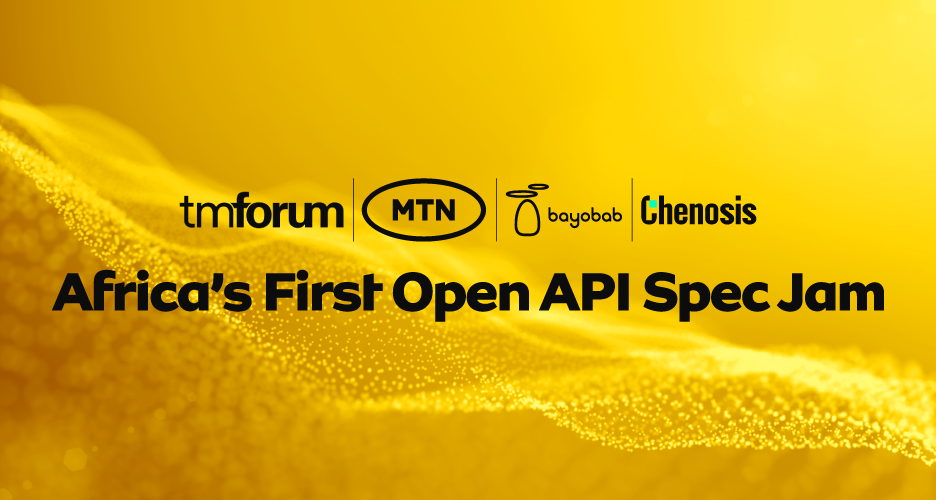
MTN Group hosted Africa’s first TM Forum Open API Spec Jam, with active participation from across its digital ecosystem, including Chenosis and Bayobab. Over four days in Johannesburg, 130 technical professionals from 21 companies and three continents came together with a clear goal: to develop API specifications that reflect real-world integration challenges and support scalable digital services across African markets.
Participation was both technical and strategic. Attendees included architects, developers, platform specialists and ecosystem leads from telecommunications operators, fintech firms and digital service providers. The engagement reflected strong interest in using APIs to unlock cross-industry capabilities, particularly in areas such as identity verification, fraud detection, financial services integration and distributed ledger applications.
The result was a set of 11 Open API specifications, each co-developed with deployment in mind. These APIs were shaped by practical use cases, from fraud reduction and customer onboarding to data integrity and AI accessibility. Every specification was grounded in the operating realities of the continent and informed by the shared experience of those building and managing digital infrastructure across Africa.
“Africa’s digital future will be shaped by the standards we define today,” said Nikos Angelopoulos, MTN Group Chief Information Officer. “Hosting the first Open API Spec Jam on the continent is an important step in ensuring those standards reflect African realities and are built for scale. This Spec Jam has shown what becomes possible when regional expertise meets global collaboration. It affirms our belief that open standards are essential to building the digital infrastructure our markets need to grow, integrate and adapt.”
The APIs specified during the Spec Jam focused on key areas where consistency and interoperability are critical to enabling digital services. These included digital identity, where standardised approaches can support more secure access to financial services; location data, which plays a role in improving emergency response, logistics and city planning; and lightweight AI models, aimed at supporting greater inclusion on basic mobile devices. Other areas of focus included blockchain interfaces to strengthen data integrity and transactional trust, loyalty and engagement mechanisms to support more targeted customer experiences, and standards that could enhance the efficiency of 5G network management in diverse operating environments.
The event also served as a platform for collaboration across MTN Group’s technology ecosystem. Contributions from Chenosis, MTN’s API marketplace, and Bayobab, its digital infrastructure business, ensured the work remained grounded in real operating conditions. Their teams brought practical insights on developer enablement and infrastructure scalability, supporting the development of specifications shaped for real-world deployment.
“Thank you to MTN, and its teams from Bayobab and Chenosis for hosting the first-ever TM Forum Open API Spec Jam in Africa,” said Nik Willetts, CEO of TM Forum. “We achieved record-breaking participation and shone a spotlight on African innovation. The contributions made here will influence global API standards for years to come.”
The session also highlighted the importance of regional participation in shaping technical standards. By contributing directly to the specification process, African developers and ecosystem leaders are helping build tools that are both relevant and usable. This engagement strengthens the connection between standardisation and delivery and ensures that the solutions developed reflect both market needs and implementation realities.
This first Open API Spec Jam on African soil demonstrated what becomes possible when technical alignment meets contextual understanding. By working collectively to define shared digital building blocks, participants helped lay the groundwork for infrastructure that can scale with confidence, respond to local conditions and evolve as new services emerge. For MTN, it reflects a continued commitment to advancing open, inclusive digital ecosystems that support growth across the continent and beyond.

Connectivity is more than technology; it’s about opportunity, making digital inclusion a critical catalyst for the continent’s socioeconomic growth.
When people ask what progress looks like, I typically point to a classroom in rural Uganda that has digital access for the first time. Or to an entrepreneur in Cameroon using MTN’s mobile money platform, MoMo, to run her business. Or a solar-powered site in Ghana, connecting people in places that have no hard infrastructure.
For us at MTN, this is our work. It’s how we live our purpose: enabling the benefits of a modern connected life for everyone across our markets.
It is the framework that guides how we invest, partner, innovate, and govern our business. In 2024, we invested nearly R30bn in infrastructure and technology and paid income taxes of more than R10bn. These contributions matter. But it’s what they enable — such as jobs and opportunities — that defines us.
In 2024, we powered digital connectivity for 291-million people, including internet access for 158-million users and financial services for 63-million through MoMo.
About 93% of the population in our markets — or 500-million people — are now covered by our broadband network. We facilitated digital literacy for 22-million people, promoting meaningful participation in the digital economy. Through our GSM network and MoMo businesses, we supported 3.5-million indirect jobs.
Since its inception in 2007, our group-wide employee volunteerism programme — 21 Days of Y’ello Care — sees MTNers roll up their sleeves to improve the lives of their communities. Over the years, we have impacted hundreds of thousands of people. The campaign is testament to the power of collective action, reminding us that even small acts of kindness can create a ripple effect of change.
Progress is never a solo effort. It requires collaboration across public and private sectors, across borders and disciplines. Whether it’s partnering with governments to expand coverage, working with innovators to extend digital finance, or engaging civil society to deepen inclusion, we know the best results come when we listen and co-create.
Keeping consumer experiences safe is part of the responsibility we carry. We know that trust is earned and we remain focused on building resilience, protecting digital human rights, and responding transparently when challenges arise. We carry this responsibility with humility and determination. And it’s the lens through which we will continue to serve and invest.
Amid the current significant geopolitical shifts and technological developments, it’s clear that Africa needs to chart and champion its own growth and progress. If it doesn’t, there is a real risk that the continent gets left behind. Embracing technologies such as 5G, non-terrestrial networks and generative AI will be key drivers of future progress and socioeconomic development.
At MTN, we believe that there are some foundational policy positions that will be critical for technology to meaningfully drive more inclusive growth. These include:
These foundational policy positions, consistently adopted across the continent, have the power to drive structural growth of the digital economy of Africa, and realise the continent’s full potential as we look to achieve the goals of the AU Agenda 2063 and beyond.
By Ralph Mupita, MTN Group President & CEO
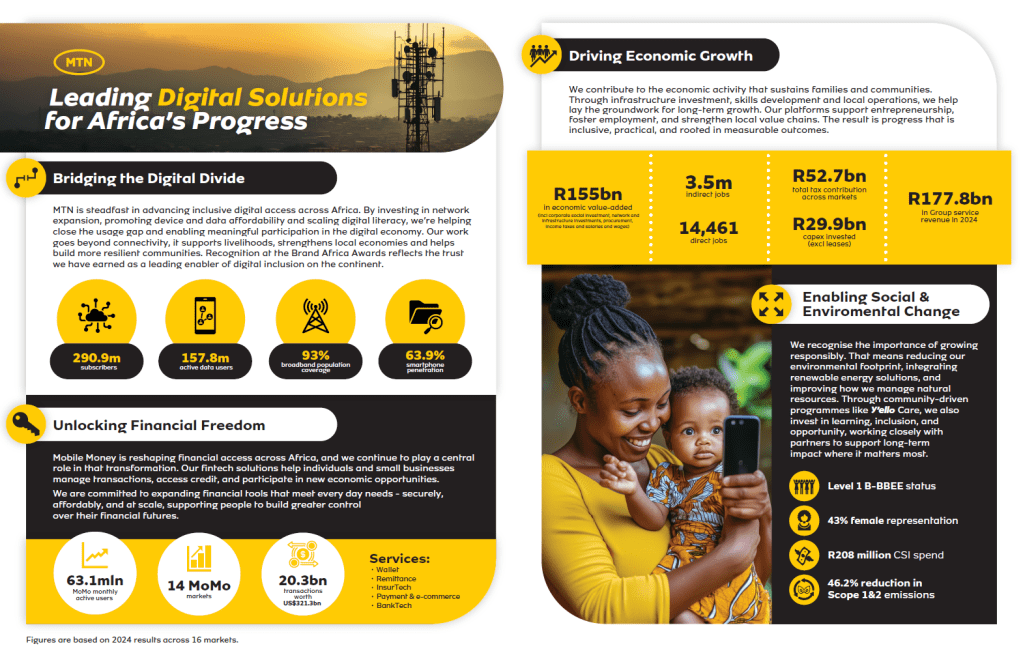
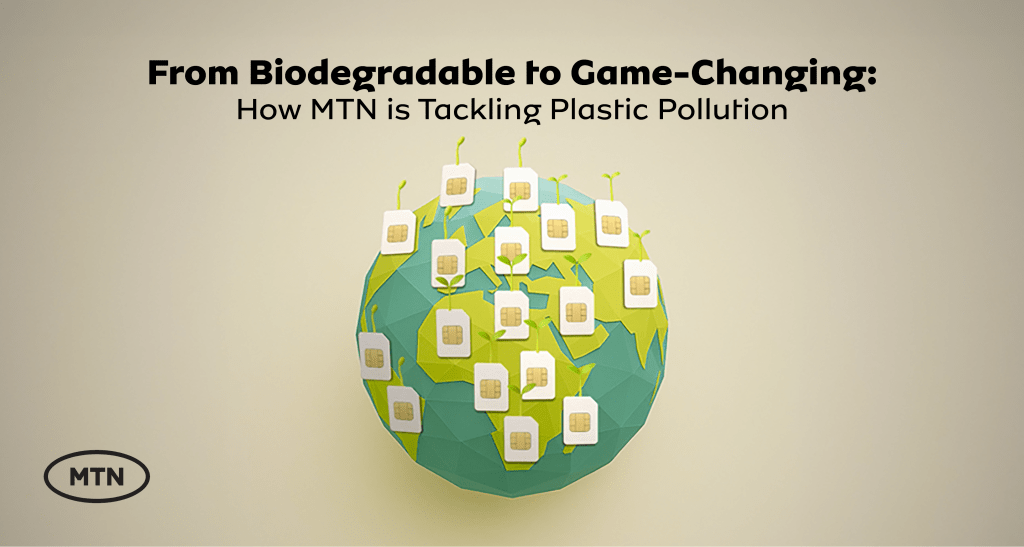
Global plastic production, exceeding 400 million tonnes annually, demonstrates that plastic pollution remains an urgent challenge. More than half of it is designed for single use. The message for World Environment Day 2025 is unequivocal, we need to beat plastic pollution, and we need to do it with urgency.
This issue touches every sector. Telecommunications is no exception. While mobile operators are typically associated with connectivity, the industry has a legacy plastics problem hiding in plain sight. In 2020 alone, approximately 4.5 billion plastic SIM cards were produced globally. These small plastic cards are widely used and rarely recycled. Many end up in landfills or as litter. Others are incinerated, contributing to emissions. They are not the most visible source of waste, but they are a meaningful one, and entirely avoidable.
At MTN, we have taken a deliberate step to reduce this form of plastic waste. In 2024, we introduced bioSIMs, SIM cards made from 100% biodegradable, FSC-certified paper. They perform exactly like plastic SIMs but break down naturally when discarded. No harmful residue. No microplastic. Just responsible design, built for a more sustainable future.
The rollout began in Rwanda and expanding across other markets. It is a practical innovation grounded in science, not sentiment. And while it won’t solve plastic pollution on its own, it is part of a larger, necessary shift in how telecoms, and business at large, approach environmental responsibility.
Africa has a central role in this conversation. The continent contributes just 3–4% of global greenhouse gas emissions, yet it faces some of the worst consequences of climate change. At the same time, Africa is grappling with an accelerating waste challenge. By 2060, annual plastic waste in sub-Saharan Africa is projected to reach 116 million tonnes, a sixfold increase from 2019. The region’s rapid urbanisation and insufficient waste infrastructure make it highly vulnerable to both climate and pollution shocks.
It’s essential. Every tonne of plastic avoided reduces long-term risk, for people, infrastructure, and the planet. Our bioSIMs are part of a broader commitment at MTN to embed sustainability across our operations. As the UNEP reminds us, the solutions are available. What we need now is implementation at scale. Scaling starts with design. The average SIM card may weigh just four grams, but multiplied across millions of users, the footprint grows quickly. A small change in design, if adopted broadly, can remove tonnes of plastic from the supply chain each year. That’s the logic behind our bioSIM. It is efficient, cost-effective, and fundamentally better for the environment.
We are also expanding eSIM adoption, which removes the need for a physical card altogether. Combined, these efforts enable our customers to reduce their impact through the choices they make every day. That is where real momentum lies, not just in corporate strategy, but in shifting consumer norms.
This World Environment Day, the message is clear. Plastic pollution is a problem that can be solved. But doing so will require collective action, practical innovation, and a willingness to change how we operate. MTN is committed to being part of that change, starting with how we connect the communities we serve.
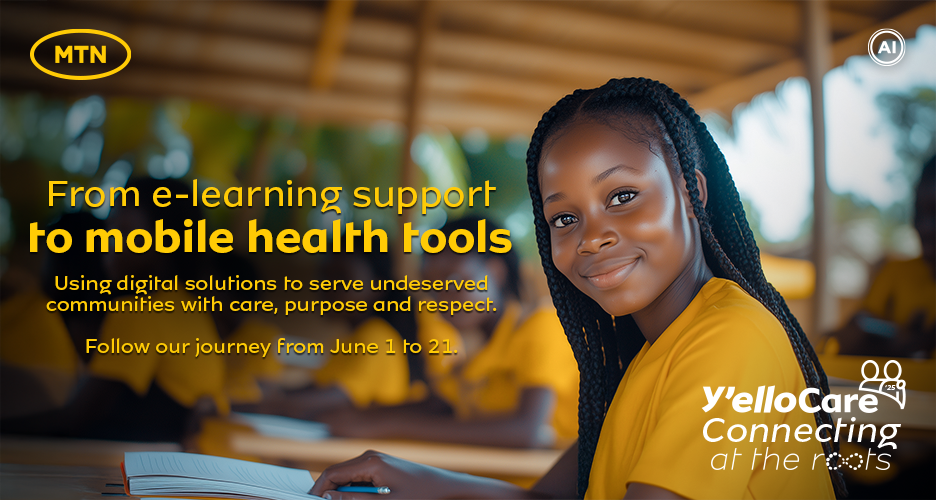
MTN Group is pleased to announce the 2025 edition of 21 Days of Y’ello Care, our highly anticipated flagship employee volunteerism campaign, taking place from 1-21 June 2025.
Now in its 18th year, Y’ello Care continues to demonstrate the power of employee-led action to drive meaningful change across the communities we serve. Since its inception, the campaign has mobilised thousands of MTN employees to support impactful initiatives focused on education, health, youth development, and economic empowerment.
Each year, the campaign evolves to reflect the most pressing needs of society, while remaining grounded in our commitment to enable the benefits of a modern connected life for everyone. Over the past 6 years, we have reached the lives of 107,034 people across our communities through the impact of 14,376 MTN volunteers completing 56,306 cumulative hours of community engagement.
This year’s theme, “Connecting at the Roots – Connecting communities through the use of digital tools,” responds to the ongoing challenge of digital exclusion, particularly in rural, remote, and underserved areas. Across many parts of Africa, limited connectivity continues to constrain access to education, healthcare, financial services, and economic opportunity. Women, youth, persons with disabilities, and displaced populations are disproportionately affected.
Y’ello Care 2025 will see MTNers across our markets implement practical, community-led initiatives that leverage technology to unlock connectivity to bridge these gaps.
“Y’ello Care reflects our belief that real progress begins at the grassroots level. In 2025, we are focusing our efforts on the communities that remain on the margins of digital access and connectivity. By applying technology in ways that are practical, inclusive, and sustainable, we are working to ensure that no one is left behind,” said Nompilo Morafo, MTN Group Chief Sustainability and Corporate Affairs Officer. “Our people remain the driving force behind this campaign, and their continued commitment to serving with purpose is what makes Y’ello Care a true embodiment of MTN’s values.”
In line with MTN’s values, the campaign prioritises meaningful partnerships, responsible delivery, and inclusive engagement. Through trusted collaborations with community stakeholders, we aim to develop practical solutions that are responsive to local contexts, respectful of community aspirations, and inclusive of those most often excluded from digital progress.
Through Y’ello Care, MTN reaffirms its belief in the transformative power of technology and in the ability of our people to be agents of positive change. We look forward to working together with communities and partners to deliver meaningful, sustainable impact where it is needed most.
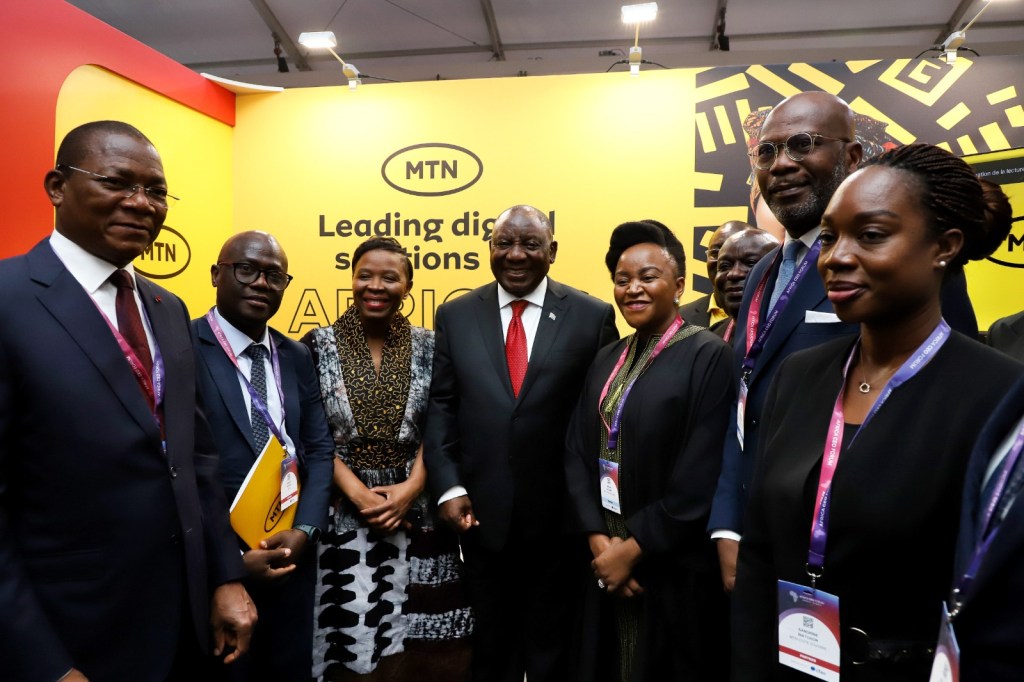
As part of our work to deepen stakeholder relations and partnerships for Africa’s progress, MTN Group is a platinum sponsor of the Africa CEO Forum, which brings together the continent’s most influential decision-makers for two days of meetings on the private sector’s key role in accelerating Africa’s development.
The 12th edition of the annual summit is taking place in Abidjan on 12–13 May 2025. Some 2 000 business leaders, investors and policy makers are in attendance to shape practical strategies to expedite Africa’s economic transformation.
The theme for 2025 is ‘Africa in a transactional world: Can a new deal between state and private sector deliver the continent a winning hand?’. It recognises the need for governments to strike a new deal with the African private sector, anchored on three pillars: an improvement of governance and accountability; targeted public policies to address Africa’s structural challenges; and the accelerated implementation of the African Continent Free Trade Agreement (AfCFTA).
“At part of our shared value priority to support Africa’s progress, we at MTN seek to align with the priorities of our continent and nation states and to actively engage governments and regulators to help shape industry dynamics,” said MTN Group Chief Sustainability and Corporate Affairs Officer Nompilo Morafo.
“MTN’s participation at the Africa CEO Forum reflects our nation states programme and our commitment to work together to enable inclusive growth,” she added, noting that escalating tensions in world geopolitics present headwinds to Africa’s budding economic recovery. “We believe the continent’s sustainable progress will come from trusted partnerships, coherent policy environments and shared investment in the systems that power Africa’s digital and economic future.”
As part of the Forum programme, MTN Group Senior Vice President: Markets, Ebenezer Asante, is participating in a panel discussion exploring tax policy and resource mobilisation. The session focuses on how public and private sector stakeholders can consult and collaborate to ensure fiscal environments that support both domestic priorities and the stability required for sustained investment.
MTN Côte d’Ivoire CEO Mitwa NG’ambi is contributing to a strategic roundtable on Africa’s digital transformation. This is looking at strategies to enhance network resilience and accelerate infrastructure deployment – particularly in underserved areas – and the role of policymakers in fostering an investment-friendly environment that accelerates digital transformation.
MTN Group’s sponsorship and participation at the Africa CEO Forum underscore our commitment to building a more connected, inclusive and prosperous Africa.
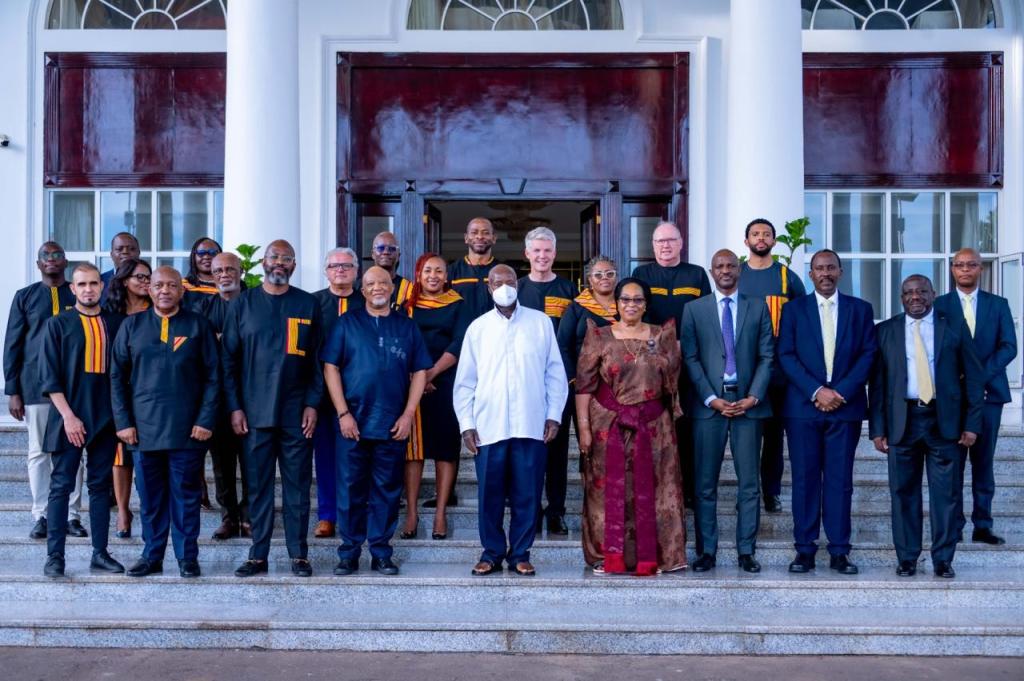
MTN Group this week convened its annual Chairmen’s Forum in Uganda, bringing together Board Chairs from its operating companies and senior executives from across the business. Held in Kampala, the Forum serves as a key leadership platform to reflect on strategic progress, strengthen alignment, and advance the Group’s ambition to lead digital solutions for Africa’s progress.
On the sidelines of the Forum, the MTN Group delegation, led by Group Chairman Mcebisi Jonas and Group President and Chief Executive Officer Ralph Mupita, engaged with national leaders and key stakeholders to reinforce the Group’s long-standing commitment to Uganda as a strategic market.
These engagements included a high-level meeting with His Excellency President Yoweri Kaguta Museveni at State House, Entebbe, as well as a stakeholder dinner hosted by MTN, attended by senior government officials.
During the State House meeting, President Museveni welcomed MTN’s continued investment and emphasised the importance of targeting sectors that generate employment and expand the economy. “If people have jobs and incomes, they will buy more phones and use them more,” he said. “That’s why we must invest in the four key sectors of wealth and job creation: commercial agriculture, manufacturing, services, and ICT.” He further encouraged MTN to explore cross-border investment as a means of promoting regional integration and intra-African trade.
Uganda holds a distinct place in MTN’s history as the first country outside South Africa where the Group secured a telecommunications licence. Granted in 1998, this licence marked the beginning of MTN’s international expansion, laying the foundation for what would become one of Africa’s leading digital infrastructure and platform businesses. Today, MTN Uganda stands as one of the Group’s most important markets, commercially and developmentally.
Mcebisi Jonas, MTN Group Chairman, expressed appreciation for the long-standing collaboration between MTN and the Government of Uganda. “We just came today to say thank you very much for the support you have always given us. We have had excellent collaboration from the regulators, and MTN is not here for the short term—we are here for the long haul,” he said. He also emphasised MTN’s interest in strengthening trade and business linkages between Uganda and South Africa, and highlighted the Group’s broader capacity to support national development. “We believe there is real opportunity to help Ugandan businesses enter the South African market, and that is something we can explore further.”
As MTN Group continues to drive the acceleration of Africa’s digital future, Uganda remains a key partner, demonstrating the enduring value of early investment, collaborative nation-building, and a shared commitment to inclusive and sustainable progress.
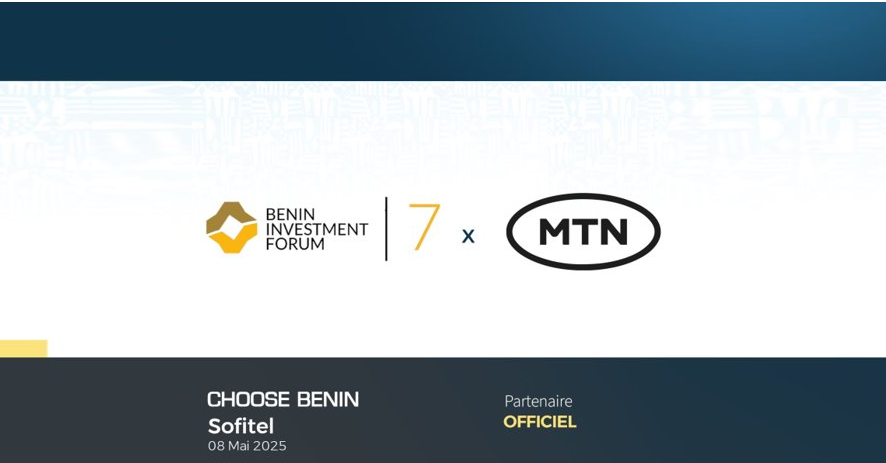
The 7th edition of the Benin Investment Forum (BIF) will take place from 8 to 9 May 2025 at the Sofitel Hotel in Cotonou, bringing together leaders from government, business, and civil society to foster economic cooperation, attract foreign direct investment, and promote inclusive development. Organised by the Government of Benin through the Investment and Export Promotion Agency (APIEX) and the Benin Chamber of Commerce and Industry, the Forum comes at a crucial moment in Benin’s development, underpinned by structural reforms and macroeconomic stability.
MTN Group proudly joins the Forum as the Platinum and Headline Sponsor. This strategic partnership follows MTN Group President and CEO, Ralph Mupita’s market visit to Benin in January 2024, where the company reaffirmed its longstanding commitment to the country’s development as a trusted partner. MTN’s participation at BIF 2025 will be led by Senior Vice President Markets Ebenezer Asante, who will deliver a keynote address at the Opening Ceremony on the topic “MTN: Partner in Africa’s Development.” He will be joined by MTN Benin CEO Uche Ofodile and MTN Group Chief Sustainability and Corporate Affairs Officer Nompilo Morafo, both of whom will participate in high-level discussions on finance, the future of technology, and women’s leadership in business.
MTN will also take the lead in hosting the exclusive MTN Investment Night, a high-level networking engagement aimed at facilitating meaningful dialogue among investors, policymakers, and senior business leaders. As part of its broader contribution to the Forum, MTN will collaborate with the Benin Ministry of Trade and Commerce to evaluate start-up pitches, spotlighting innovative solutions from emerging entrepreneurs. Additionally, the Group will deliver an inspirational leadership masterclass, curated to inspire and equip the next generation of African business leaders with insights drawn from MTN’s journey of growth and transformation across the continent.
Having operated in Benin for more than 25 years, MTN has made significant contributions to the country’s digital infrastructure, financial inclusion, and social development. The Group has committed over $215 million in new investments through 2026, including the rollout of 5G services, expansion of fibre connectivity, and the construction of a new MTN Benin headquarters. MTN’s impact also extends into health, education, and entrepreneurship through the work of the MTN Foundation, reinforcing its belief that digital access is key to unlocking national and regional progress.”
Commenting on MTN’s commitment to the Benin Investment Forum and the country, Ebenezer Asante, MTN Group Senior Vice President, Markets stated: “Our presence at the Benin Investment Forum reflects more than sponsorship, it’s a reflection of our unwavering belief in Benin’s potential and our shared journey toward inclusive digital transformation. Through strategic partnerships rooted in national development goals, MTN is proud to be a catalyst for progress, investment, and innovation in Benin and across the continent.”
MTN’s participation in the Benin Investment Forum 2025 exemplifies the company’s belief that inclusive, resilient growth must be rooted in strategic collaboration between the public and private sectors. As a partner of choice to African governments, MTN continues to play a leading role in building the infrastructure, capabilities, and ecosystems required for nations to thrive in a digital world. Through its involvement in BIF 2025, MTN reaffirms its commitment to Benin’s development journey and to advancing Africa’s digital and economic integration.
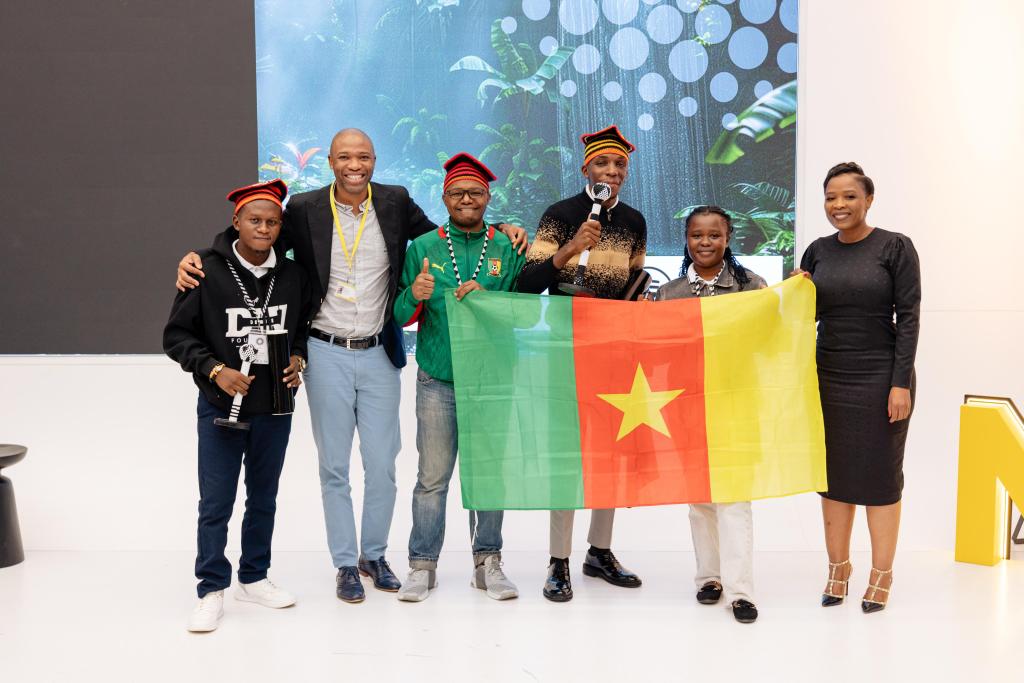
The 2024 Africa PachiPanda Challenge, an initiative by MTN Group in partnership with WWF and FNB WesBank, concluded this week with a powerful celebration of Africa’s emerging eco-entrepreneurs. Hosted in Johannesburg, South Africa, the grand finale brought together the brightest young minds from across the continent, united by a shared vision for environmental sustainability and inclusive growth.
The initiative was designed to spotlight Africa’s next generation of environmental leaders and equip them with the tools, mentorship, and networks needed to scale their climate-smart solutions. Finalists from Nigeria, Cameroon, Zambia, and South Africa were invited to participate in a transformative two-day programme, which included expert-led masterclasses on business development, sustainable innovation, and impact measurement, culminating in a vibrant finale event that showcased the continent’s most promising green ventures.
Among the standout innovators, chosen by a distinguished panel of judges for its outstanding scalability, measurable impact, Moses Afopezi of Cameroon claimed first prize for his project AgricFresh, a tech-enabled platform designed to reduce post-harvest loss by professionalising farm management and enhancing market access. By integrating solar-powered cold storage systems, AgricFresh helps extend the shelf life of crops and supports a more efficient, climate-resilient agricultural ecosystem.
Olabisi Rafatu Emmanuel from Nigeria earned second place, and Jean Blaise Seka, also from Cameroon, secured third, with both recognised for their impactful, community-driven solutions that address local environmental challenges with creativity and ingenuity.
“Congratulations to Moses Afopezi and the AgricFresh team for this well-deserved recognition. Their work reflects the kind of grounded, forward-thinking innovation that communities across Africa urgently need,” said Nompilo Morafo, MTN Chief Sustainability and Corporate Affairs Officer. “The Africa PachiPanda Challenge is one of the ways we’re working with partners to support climate entrepreneurship that is practical, inclusive, and rooted in real local needs.”
Innovation, particularly in climate-tech and sustainable development, is increasingly recognised as a cornerstone of inclusive growth. According to the African Development Bank, every dollar invested in climate-resilient infrastructure yields four dollars in economic benefits. Initiatives like the Africa PachiPanda Challenge are helping to unlock this potential by equipping young innovators with the tools to scale locally rooted solutions. From digital platforms for waste management to energy-efficient technologies for agriculture, these ventures reflect the ingenuity of a generation that is redefining what progress looks like, bold, green, and built from the ground up.
WWF echoed their commitment to supporting youth-led solutions. WWF-Zambia Chief External Engagement Officer Fungai Musana, as the lead for the Africa lag said, “WWF is proud to be part of a historic moment, the successful execution of the inaugural Africa PachiPanda Innovation Challenge. This trailblazing, youth-led initiative marks a first of its kind on the African continent. A huge congratulations to the winners for their cutting-edge innovations! And to all participants, well done for stepping up and being part of this incredible journey. WWF is honoured to collaborate with MTN Group in empowering the next generation of sustainable leaders. We believe the ideas born from this challenge have the power to drive meaningful, lasting change for communities and the environment across Africa.”
Adding further support, FNB WesBank underlined the critical role that green innovation plays in Africa’s future, Kyle Durham Head of Sustainability at FNB Commercial, added that FNB, in partnership with WesBank is thrilled to be a part of the Africa PachiPanda Challenge and to support this groundbreaking initiative. The event has been a showcase of inspiring and visionary solutions to unique challenges, and AgricFresh stands out as a shining example of the innovation, passion, and dedication that young eco-entrepreneurs bring to the table, creating lasting impacts for a sustainable future.
As the overall winner of the Africa PachiPanda Challenge, Moses Afopezi AgricFresh project will receive USD 5000, along with ongoing mentorship and strategic support from MTN Group, WWF, UNDP, GSMA and other partners to expand the reach and impact of their innovation. Moses shared a brief insight on his experience: “Never did I imagine that the path to an international stage would be paved by the work we are doing at the grassroots level with AgricFresh. The recognition we’ve received fills me with immense joy and hope for the farmers whose lives we aim to improve. With the knowledge and prize, we’re now empowered to expand our reach to two more communities in Cameroon’s war-affected regions.”
Through this initiative, MTN, together with WWF and FNB WesBank, reinforces its commitment to supporting ideas that deliver lasting value for the environment and local communities. With a footprint in 16 markets across Africa, MTN recognises the unique responsibility and opportunity to provide young innovators with the visibility, resources, and support they need to thrive.
This challenge is a testament to how MTN is embedding sustainability into the way it operates, by investing in people and purpose, with a long-term view toward shared prosperity.